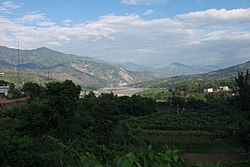Liangshan Yi Autonomous Prefecture
|
Liangshan Prefecture 凉山州 · ꆃꎭꍏ |
|
|---|---|
| Autonomous prefecture | |
|
凉山彝族自治州 · ꆃꎭꆈꌠꊨꏦꏱꅉꍏ
Liangshan Yi Autonomous Prefecture |
|
 |
|
 Location of Liangshan Prefecture in Sichuan |
|
| Coordinates: 27°53′N 102°16′E / 27.883°N 102.267°E | |
| Country | People's Republic of China |
| Province | Sichuan |
| Prefecture seat | Xichang |
| Area | |
| • Total | 60,423 km2 (23,329 sq mi) |
| Population (2009) | |
| • Total | 4,532,809 |
| • Density | 75/km2 (190/sq mi) |
| Time zone | China Standard (UTC+8) |
| Website | www |
| Liangshan Yi Autonomous Prefecture | |||||||
| Chinese name | |||||||
|---|---|---|---|---|---|---|---|
| Simplified Chinese | 凉山彝族自治州 | ||||||
| Traditional Chinese | 涼山彝族自治州 | ||||||
|
|||||||
| Commonly abbreviated as "Liangshan Prefecture" | |||||||
| Simplified Chinese | 凉山州 | ||||||
| Traditional Chinese | 涼山州 | ||||||
|
|||||||
| Yi name | |||||||
| Yi |
Script: ꆃꎭꆈꌠꊨꏦꏱꅉꍏ Romanisation: niep sha nuo su zyt jie jux dde zho |
||||||
| Transcriptions | |
|---|---|
| Standard Mandarin | |
| Hanyu Pinyin | Liángshān Yízú Zìzhìzhōu |
| Transcriptions | |
|---|---|
| Standard Mandarin | |
| Hanyu Pinyin | Liángshān Zhōu |
Liangshan (Chinese: 凉山; Yi: ꆃꎭ Niep Sha, pronounced [nɛ̀ʂā]), officially the Liangshan Yi Autonomous Prefecture, is an autonomous prefecture occupying much of the southern extremity of Sichuan province, People's Republic of China; its seat is Xichang. Liangshan has an area of 60,423 km2 (23,329 sq mi) and over 4.5 million inhabitants (2010). It is also has the largest population of ethnic Yi nationally. Liangshan Li contains a number of isolated villages high up on its cliffs, often known as "cliff villages".
Yi people came into Chinese and western history books as "罗罗" (Lolo) and "" (Yi) in the beginning. After the Chinese Communist Party came into power in mainland China, the government changed the spelling of the name from "夷" to "" since the old character was derogatory.
The appellations of Lolo, Lolopu, etc. are related to the Yi people’s worship of the tiger, as lo in their dialects means "tiger". Lo is also the basis for the Chinese exonym Luóluó 猓猓, 倮倮, or 罗罗. The original character, 猓, with the "dog radical" 犭and a guǒ 果 phonetic, was considered condescending, comparable to the Chinese name guǒran 猓然 "a long-tailed ape".
Writing reform in the People’s Republic of China replaced the 猓 character in Luóluó twice: first by Luó 倮, with the "human radical" 亻and the same phonetic, but that was a graphic variant for luǒ 裸 "naked"; and later by Luó 罗 "net for catching birds". However, the stigma remained and resulted in negative remarks when people of the prefecture visited other cities, so the government changed the name of the prefecture.
...
Wikipedia
